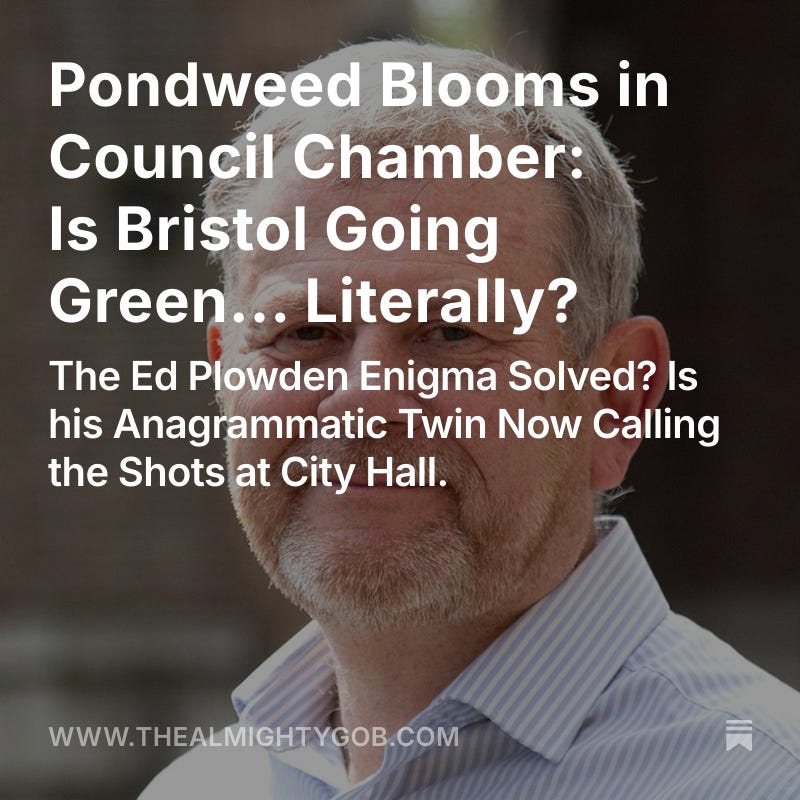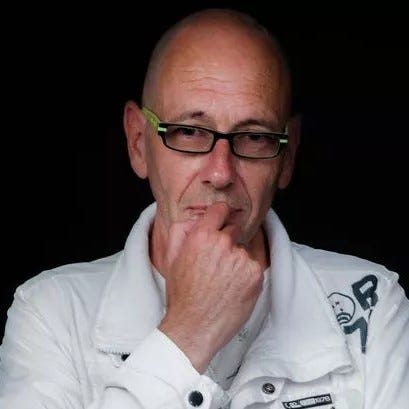Pondweed Blooms in Council Chamber: Is Bristol Going Green... Literally?
The Ed Plowden Enigma Solved? Is his Anagrammatic Twin Now Calling the Shots at City Hall.
(Image: Ed Plowden, courtesy of TransportXtra)
Right then, buckle up, Bristolians, because we're about to take an even deeper dive into the murky undercurrents of our local political scene, a place where well-intentioned policies can sometimes feel like we're all wading through treacle. And at the heart of this intriguing aquatic drama is none other than Councillor Ed Plowden, our esteemed Green Party representative. Now, pay very close attention, because this is where things get… particularly sticky. You see, Councillor Plowden possesses a rather unique linguistic quirk, a serendipitous rearrangement of his very name that gifts us with an image so vivid, so… clinging, that it's likely to take up permanent residence in the recesses of your mind: L Pondweed.
Yes, L Pondweed. Conjure up the image: a serene, perhaps slightly smug, inhabitant of Bristol's metaphorical waterways, surrounded by the gentle sway of bureaucratic reeds and the slow, deliberate drift of council initiatives. It’s a mental picture that, once formed, is rather difficult to dislodge, much like a particularly stubborn bit of algae on a wellington boot.
Councillor Plowden, or L Pondweed when the mood (and the policy) strikes us, chairs the Transport and Connectivity Committee, a pivotal role in shaping how we all navigate our beloved, and increasingly congested, city. His background is certainly commendable, a long stint in public and voluntary sectors, including a period as Head of Local and Sustainable Transport where he championed initiatives like the 20mph speed limit and cycling infrastructure. More recently, he served as the UK Director of Paths for Everyone at Sustrans. A man of considerable experience, no doubt. Yet, it's the L Pondweed lurking within that seems to be making… waves.
The current source of much civic consternation is the roll-out of Low Traffic Neighbourhoods (LTNs). Now, on paper, these schemes sound positively utopian: reduce through-traffic in residential areas, create havens of peace and quiet, encourage active travel. But the reality, as experienced in places like South London, Exeter, and a veritable flotilla of London boroughs – Camden, Croydon, Ealing, Hackney, Hounslow, Islington, Lambeth, Newham, and Waltham Forest – often resembles something dredged from the bottom of a stagnant canal. Increased congestion on main roads, longer journey times, and a general feeling of being… well, stuck.
And this, dear readers, is where the spectre of L Pondweed looms large. Could it be that Councillor Plowden's unwavering commitment to these LTNs isn't solely rooted in the dry data of traffic flow models? Might there be a deeper, perhaps subconscious, yearning within him, a primordial urge emanating from his anagrammatic soul, to transform Bristol's arteries into a network of calm, if somewhat sluggish, channels? Is his political compass, perhaps, subtly influenced by the desires of his inner L Pondweed, a yearning for a city where the pace of life matches the gentle bobbing of a lily pad?
Let's be frank, the term "trial" when applied to these LTNs feels about as temporary as a council tax rebate. The installation of bollards and planters, those physical manifestations of traffic redirection, carry an air of permanence that belies the notion of a fleeting experiment. Residents, understandably, feel less like they're participating in a scientific study and more like they're adapting to a new, uninvited, and often inconvenient landscape. And with these "trials" stretching into months, the prospect of reversal often feels as likely as finding a dry patch in a bog. The language, therefore, is crucial. Calling these implementations "trials" risks eroding trust and fostering the suspicion that decisions are already as firmly rooted as, well, pondweed.
The consequences are real. Businesses are feeling the pinch, emergency services are navigating a more convoluted route, and many residents feel marooned in their own neighbourhoods. While Councillor Plowden and the Green Party champion these schemes as vital for reducing pollution and promoting active travel, the anecdotal evidence from the ground suggests we’re less creating a green utopia and more a series of interconnected traffic jams, a bit like trying to unclog a drain by blocking off all the other pipes.
So, as we inch our way through Bristol's increasingly aquatic-feeling road network, the question hangs in the air like a persistent summer haze: are we witnessing sound urban planning, or is our city being subtly terraformed by the subconscious aquatic inclinations of L Pondweed? Is this sustainability in action, or are we simply cultivating the perfect environment for some slow-moving organic matter to thrive? The jury's out, but one thing is becoming increasingly clear: navigating Bristol's roads is starting to feel like an exercise in advanced wetland management.
And speaking of things that feel permanently stuck, let's wade into another fascinating corner of Bristolian life: the Metrobus ticket machines. Now, unlike some other buses in our fair city that still deign to accept those archaic things called 'coins,' the Metrobus operates on a strictly cashless system. Journeys, we are told, are to be purchased via the mystical realm of a mobile application. However, for those of us who enjoy the tangible experience of a ticket (or whose phone battery has decided to stage a dramatic protest), we have the pavement-installed 'MetroBus Ticket Machines.' And it's these blinking, often temperamental, metal behemoths that a recent council report has declared an "iconic presence" as part of our "flagship public transport service." Iconic? One can only imagine the brainstorming session where that particular adjective floated to the surface, perhaps carried on a gentle breeze of pure delusion. Were they perhaps admiring the abstract art created by rainwater cascading down their perpetually out-of-order screens? Or maybe it's the user interface, a digital labyrinth designed to challenge the cognitive abilities of even the most seasoned commuter, that earned them this lofty title?
"Flagship public transport service," they say. This conjures images of sleek, efficient travel, a seamless ballet of buses gliding through the city. The reality, for many of us, involves a desperate tap-dance on the unresponsive screen of a ticket machine, a silent plea to the technological deities, and the distinct possibility of watching our "flagship" depart while we wrestle with this "iconic presence" that steadfastly refuses to dispense a ticket. Tourists, one imagines, won't be queuing to marvel at Clifton Suspension Bridge, but rather to witness the raw, unadulterated struggle of a Bristolian attempting to extract a piece of paper from a machine that seems to have a personal vendetta against human interaction. "Darling," one might whisper, "behold the very essence of modern commuting!"
Perhaps the council is onto something. Maybe these machines are iconic in the same way that a particularly persistent pothole becomes a beloved (and frequently cursed) landmark. They are a shared experience, a unifying source of collective frustration that binds us all together in the daily ritual of attempting to access a service that actively seems to resist our attempts. Yes, the Metrobus ticket machine: a true icon of the Bristolian commute, forever etched in our memories alongside the silent rage directed at a screen displaying the eternally optimistic message "Out of Service." Part of the "flagship" experience, you see. You simply can't have one without the other. It's as Bristolian as a yearning for sunshine and a muttered complaint about the traffic.
Finally, we arrive at the Green Party administration's grand vision for the next decade: "Fair, Green, and Thriving: Bristol's Economic Strategy 2025-2035." This ambitious document paints a picture of a future Bristol so ecologically pristine and socially equitable that one might suspect it was drafted during a particularly potent kale smoothie-induced reverie.
The strategy boldly aims for "Net Zero by Tea Time," a decarbonisation target so ambitious it seemingly overlooks the rather significant role fossil fuels currently play in, well, everything. It also champions "Radical Wealth Harmonisation," a phrase so delightfully ambiguous it could mean anything from a slightly fairer tax system to everyone sharing their artisanal sourdough starter. And while acknowledging "growth-driving sectors," the plan's true affection seems to lie with the "foundational economy," leading some to suspect that Bristol's economic engine of the future will be powered by the relentless fermentation of organic vegetables.
Yet, amidst these lofty aspirations, the "iconic presence" of the Metrobus ticket machine rears its often-malfunctioning head. These rain-streaked symbols of public transport purgatory, officially deemed "iconic," serve as a grounded (and frequently infuriating) reminder that even the most visionary plans can be tripped up by the mundane realities of a temperamental piece of technology that can't even reliably dispense a ticket for a bus that doesn't take cash.
As the Green Party administration, perhaps guided by the steady hand of Councillor Ed Plowden and the subtle influence of his inner L Pondweed, steers Bristol towards its kale-infused, traffic-pond-adjacent future, the enduring saga of the Metrobus ticket machine serves as a potent metaphor. It's a reminder that while we dream of a utopian tomorrow, we still have to navigate the frustrating realities of today, one failed app attempt and unresponsive ticket machine at a time. And as the next election looms, one can't help but wonder if voters will be more swayed by the promise of a carbon-neutral future or the lingering memory of that time the "iconic" machine simply stared blankly back at them. One thing's for sure: in Bristol, the political waters, much like our traffic and our ticket machines, are rarely smooth, and the image of L Pondweed is likely to linger in the collective consciousness for quite some time to come.




Brilliant!
Why is everything in Britain so shit? The port city of Marseille, in the south of France is comparable in some ways to Bristol. They had 2 underground metro lines up and running in 1978. In the past 15 years 2 tramways one of which is currently being extended. And on the trams or buses you can pay for rides by simply tapping your card or phone on the reader. For those who prefer paper tickets the machines work and most will take all payments including cash.
This is typical in just about any major French city public transport is just easy to navigate.